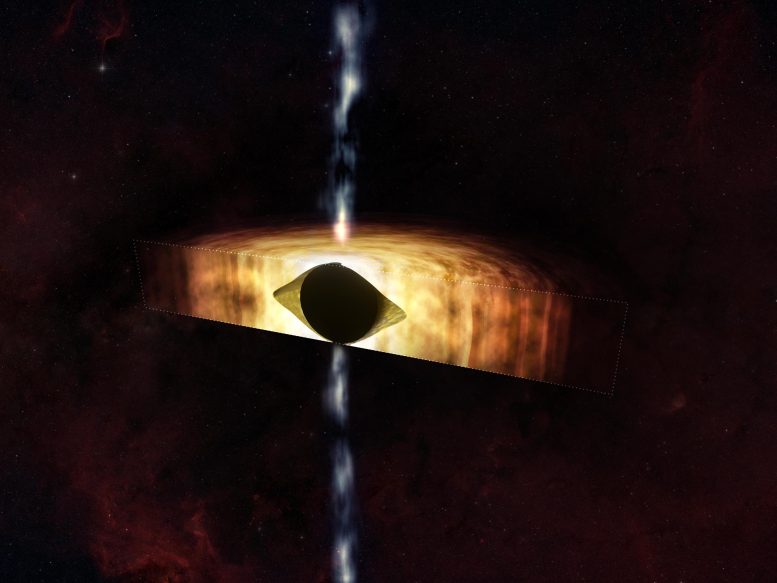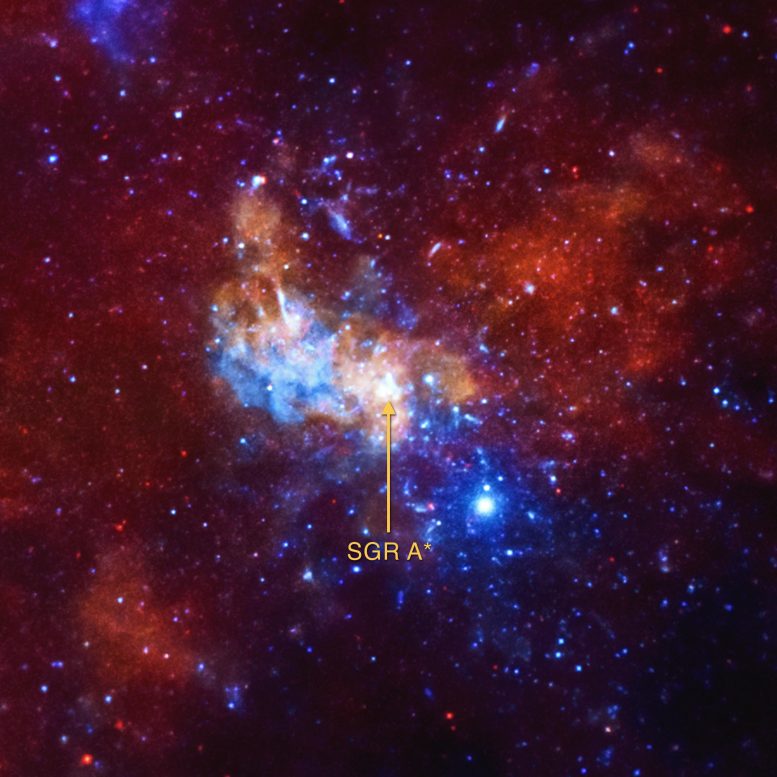
This artist's illustration shows a cross-section of a supermassive black hole and surrounding material at the center of our galaxy. The black sphere in the center represents the event horizon of the black hole, the point of no return from which nothing, not even light, can escape. When looking at a rotating black hole from the side, as shown in this illustration, the spacetime surrounding it is shaped like an American football. The yellow-orange material on either side represents gas swirling around the black hole. This matter inevitably rushes into the black hole and crosses the event horizon once it falls into the spherical shape. Thus, the region inside the football shape but outside the event horizon is depicted as a cavity. The blue dots show jets shooting away from the poles of the rotating black hole. Image credit: NASA/CXC/M.Weiss
- A new study may help resolve the question of how quickly milky wayenormous Black hole Spins.
- The black hole, known as Sagittarius A* (Sgr A*), has a mass about 4 million times that of the Sun.
- Use NASANSF's Chandra X-ray Observatory and NSF's Very Large Array, this study found that Sgr A* is rotating very rapidly.
- This high rotation distorts spacetime around Sagittarius A*, so it appears to have the shape of an American football.
This artist's illustration depicts the results of a new study of the supermassive black hole at the center of our galaxy called Sagittarius A* (abbreviated Sgr A*). This finding found that Sagittarius A* is rotating so fast that it distorts spacetime – that is, time and the three dimensions of space – so that it can look more like a football.
These results were obtained using NASA's Chandra X-ray Observatory and NSF's Karl J. Jansky Very Large Array (VLA). A team of researchers has applied a new method used X ray And radio data to determine how fast Sgr A* is rotating based on how material flows toward and away from the black hole. They found that Sagittarius A* rotates with an angular velocity of about 60% of the maximum possible value, and with an angular momentum of about 90% of the maximum possible value.
Black holes have two basic properties: their mass (how much they weigh) and their spin (how fast they spin). Determining either of these values tells scientists a lot about any black hole and how it behaves. In the past, astronomers have made several other estimates of Sagittarius A*'s rotation speed using different techniques, with results ranging from Sagittarius A* not rotating at all to it rotating at almost the maximum rate.
The new study suggests that Sagittarius A* is, in fact, rotating very quickly, squashing the spacetime surrounding it. The illustration shows a cross-section of Arc A* and the material orbiting it in the disk. The black sphere in the center represents the black hole's so-called event horizon, the point of no return from which nothing, not even light, can escape.
When looking at a rotating black hole from the side, as shown in this illustration, the spacetime surrounding it is shaped like a football. The higher the spin speed, the flatter the soccer ball becomes.
The yellow-orange material on either side represents gas swirling around Sagittarius A*. This matter inevitably rushes into the black hole and crosses the event horizon once it falls into the spherical shape. Thus, the region inside the football shape but outside the event horizon is depicted as a cavity. The blue dots show jets shooting away from the poles of the rotating black hole. If we look at the black hole from above, along the jet nozzle, we find that spacetime is circular.

Chandra X-ray image of Sagittarius A* and the surrounding area. Credit: NASA/CXC/University. From Wisconsin / Y.Bai, et al.
The rotation of a black hole can serve as an important source of energy. Supermassive black holes produce parallel jet-like outflows when their spin energy is extracted, which requires at least some matter in the black hole's vicinity. Because of the limited fuel around Sagittarius A*, this black hole has been relatively quiet in the last few thousand years with relatively weak jets. However, this work shows that this can change if the amount of material near Sgr A* increases.
To determine the black hole's spin*, the authors used an experiment-based technique referred to as the “outflow method” that details the relationship between the black hole's spin and mass, the properties of matter near the black hole, and the properties of the outflow. The parallel outward flow produces radio waves, while the disk of gas surrounding the black hole is responsible for emitting X-rays. Using this method, the researchers combined data from Chandra and the VLA with independent estimates of the black hole's mass from other telescopes to constrain the black hole's rotation.
The paper describing these findings, led by Ruth Daly (Pennsylvania State University), was published in the January 2024 issue of the journal Monthly Notices of the Royal Astronomical Society.
Reference: “New black hole spin values for Sagittarius A* obtained using the outflow method” by Ruth A Daly, Megan Donahue, Christopher P O'Dea, Biny Sebastian, Daryl Haggard, and Anan Lu, 21 October 2023, Monthly Notices of the Royal Astronomical Society.
doi: 10.1093/mnras/stad3228
Other authors are Penny Sebastian (University of Manitoba, Canada), Megan Donahue (Michigan State University), Christopher O'Dea (University of Manitoba), Darrell Haggard (McGill University), and Anan Lu (McGill University).
NASA's Marshall Space Flight Center manages the Chandra program. The Smithsonian Astrophysical Observatory's Chandra X-ray Center controls science operations from Cambridge, Massachusetts, and flight operations from Burlington, Massachusetts.

“Beer aficionado. Gamer. Alcohol fanatic. Evil food trailblazer. Avid bacon maven.”
